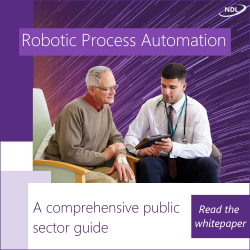Making more of artificial intelligence in healthcare requires strong rules around the use of data and an independent oversight body, according to a new parliamentary briefing report.
The All-Party Parliamentary Group on Artificial Intelligence (APPG AI) has published the document – How can AI help in the fight against Covid-19? – after a recent hearing focused on the technology’s role in disease control and the experience of countries that have used it in fighting the pandemic.
It has highlighted two major conclusions, firstly that there is a need for regulations on the responsible use of public data, along with a cross-border infrastructure for its sharing and collaboration in the field. This reflects the need for public trust in how the data is used.
Secondly, an oversight body taking in representatives of several disciplines and groups would help to ensure the ethical application of any data driven health measures, partly through overseeing the quality and governance of data.
Policy priorities
These reflect four policy recommendations, one for the creation of mechanisms to make aggregated, anonymised data publicly available to support research and scientific modelling.
But this would have to be accompanied by data safety measures to ensure personal data is saved and shared ethically; and that there is sufficient accountability and accreditation for its use – which is where the oversight body would play a significant role. It should have the authority to check and accredit new data driven tools, and discontinue any programmes that violate the ethics, according to the briefing paper.
Along with these, there is a need for government regulations to facilitate collaboration among experts from different countries and disciplines, along with the sharing of relevant data.
Among the issues identified in the report are that there is not yet a sufficient volume of data to support some powerful AI tools, such as those using deep neural networks, and that they are difficult to interrogate about their processes for making decisions.
Plus points
Despite this, AI can make significant contributions in the analysis of medical research databases. The paper points to examples of Google’s DeepMind division making structured predictions of proteins related to Covid-19, and Chinese company Baidu making an algorithm available that can predict the secondary ribonucleic acid structure of the virus.
AI has also supported earlier searches for anti-viral drugs and vaccines.
APPG highlighted a comment from Professor Birgitte Andersen, the chief executive officer of the Big Innovation Centre hub, who said: “Artificial intelligence can absolutely help us fight Covid-19 and future viral diseases, but for this to happen we must all become digital citizens and part of a wider data infrastructure.”
Image from iStock metamoreworks





